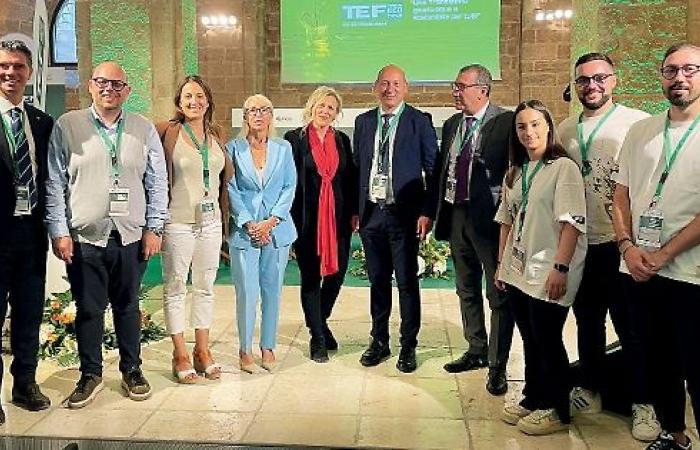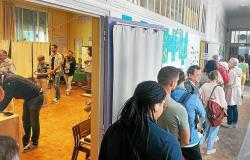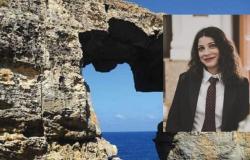With the publication of the final report, the 2024 edition of the “TEF – Taranto Eco Forum” officially closes. A substantial summary document of the work carried out on 23 and 24 May last, at the headquarters of the “Jonian Department in legal and economic systems of the Mediterranean: society, environment, cultures” of the University of Bari “Aldo Moro”, is the final act of the event organized by Eurota ETS and RemTech Expo, with the high patronage of the European Parliament and in co-branding with the Municipality of Taranto, as well as with the support of the main partner ENI and some other partners such as Edison Next and CTE Calliope.
As planned since the first meetings of the technical-scientific committee, chaired by Vito Felice Uricchio (Extraordinary Commissioner for urgent reclamation, environmentalization and redevelopment interventions in the Taranto area), the legacy of the TEF 2024 is a detailed “map” of the discussion which developed in the eight round tables dedicated to the themes chosen this year: “Artificial intelligence, real innovation”, “Corporate safety”, “Corporate social responsibility”, “Bioremediation, reclamation and valorisation of waste”, “Blue economy, between sea and port”, “Water, a precious resource to be protected”, “Renewable energies, production and exchange” and “Sustainable mobility, the transport of the future”.
With 94 contributions of high technical and scientific depth, the TEF 2024 report presents itself as an updated guide with respect to the developments that are taking place in the sectors of the environment and innovation, in particular with respect to the indications coming from the European Union with the principles of the “just transition”. «We want to offer the entire community this “white paper” of the just, equitable and sustainable transition for all – explained Patrick Poggi, president of Eurota ETS – so that citizens can familiarize themselves with its principles and stakeholders can delve deeper into its applications. This is why we decided to make it public and usable, as well as making it available to our network of relationships: it is a shared heritage that will better guide everyone’s choices. We plan to establish an institutional discussion table based precisely on the contents of the report, so that the game of the just transition is played without excluding territories and people”. «Energy poverty is a current phenomenon – the comment of Silvia Paparella, delegate councilor of Ferrara Expo and general manager of RemTech Expo – in which countries are investing significant resources. In fact, these are single people, or families, who need to be able to benefit from essential services such as the right to live in a healthy, healthy and welcoming environment. A phenomenon which, in the era of climate change, becomes even more central to the health and well-being of citizens. Changes that often also represent a potential health hazard and a health and environmental cost.
Energy poverty is increasingly gaining attention on national and global political agendas and there are various approaches and possible strategies with a view to its resolution. This is not a problem for a few, but an environmental, health and social cost for everyone. This “white paper” on the just transition was born with this spirit of analysis, promoted by the TEF, with the aim of systematizing some of the best practices and proposals that we encountered during its second edition. The intent is to share some aspects of an ongoing discussion which has its roots in the “Fit for 55” package proposed in Europe. An example of how it is not simple, but absolutely possible, to work for everyone towards the ecological transition hand in hand with social equity.”
«In our country, moments of reflection, of in-depth analysis around the themes of transition and sustainable development are found everywhere. But the TEF 2024 – added Rinaldo Melucci, mayor of the Municipality of Taranto – had something that differentiated it from other meetings on the same topic: it was not trivial that it took place in Taranto, precisely a place where the transition is taking place for some years also aiming to offer the market, private investors, public administration, young people, the business system, other stakeholders in critical territories, who have to face the same challenges, “good practices”, the same ones that are attracting with ever greater continuity the interest of European policies and many public investments. The TEF 2024 had the merit of talking about a transition that here, in the Ionian capital, has already started, as demonstrated by the programming of local authorities, think of the electric BRT or the contents of the program agreement for the former Ilva which must lead us towards the decarbonisation of the industrial model inherited from the last century, an obsolete model from which the city is emancipating itself. The TEF 2024 was more than a conference: it recounted the state of the art of this transformation, indicating how to summarize the efforts in the direction of completing this transition which will not be quick, which will require time and commitment, but which in Taranto has already had start”. Of the many ideas that can be found in the over 60 pages of the document, in fact, it is useful to underline some that have marked the centrality of the TEF 2024 in the general national debate: investments in alternative energy sources and hydrogen in particular; the interaction between different transport systems, the use of biofuels and, indeed, the impressive BRT project in Taranto; the use of corporate social responsibility as a lever for sustainability; the new frontiers of the chemical recycling of plastics or the recovery of airport scrap; the great challenge of protecting water sources from a circular economy perspective; safety in companies understood as a value and not as a cost; the development of the blue economy supply chain with material innovations, use of alternative fuels and offshore renewable plants; artificial intelligence with its positive implications in the management of manufacturing production, but also the ethical and legal implications that its abuse can entail.
The report also contains two important insights: the first on the contents of the “Manifesto of Science” presented by the Italian Scientists Association, the second on the third edition of the “call for startups” of the Faros accelerator of CDP Venture Capital. Finally, the document also contains a summary of the work carried out during the international session characterized by over 100 streaming connections, for a total of approximately thirty countries involved (including Peru, Brazil, Morocco, USA, Austria, Greece, Bangladesh and, of course, Italy), now a peculiar feature of the “TEF – Taranto Eco Forum”. The report can be consulted and downloaded both on the Eurota ETS website, at the link https://bit.ly/4bckAor, and on that of RemTech Expo, at the link https://bit. ly/3xoWNE1






